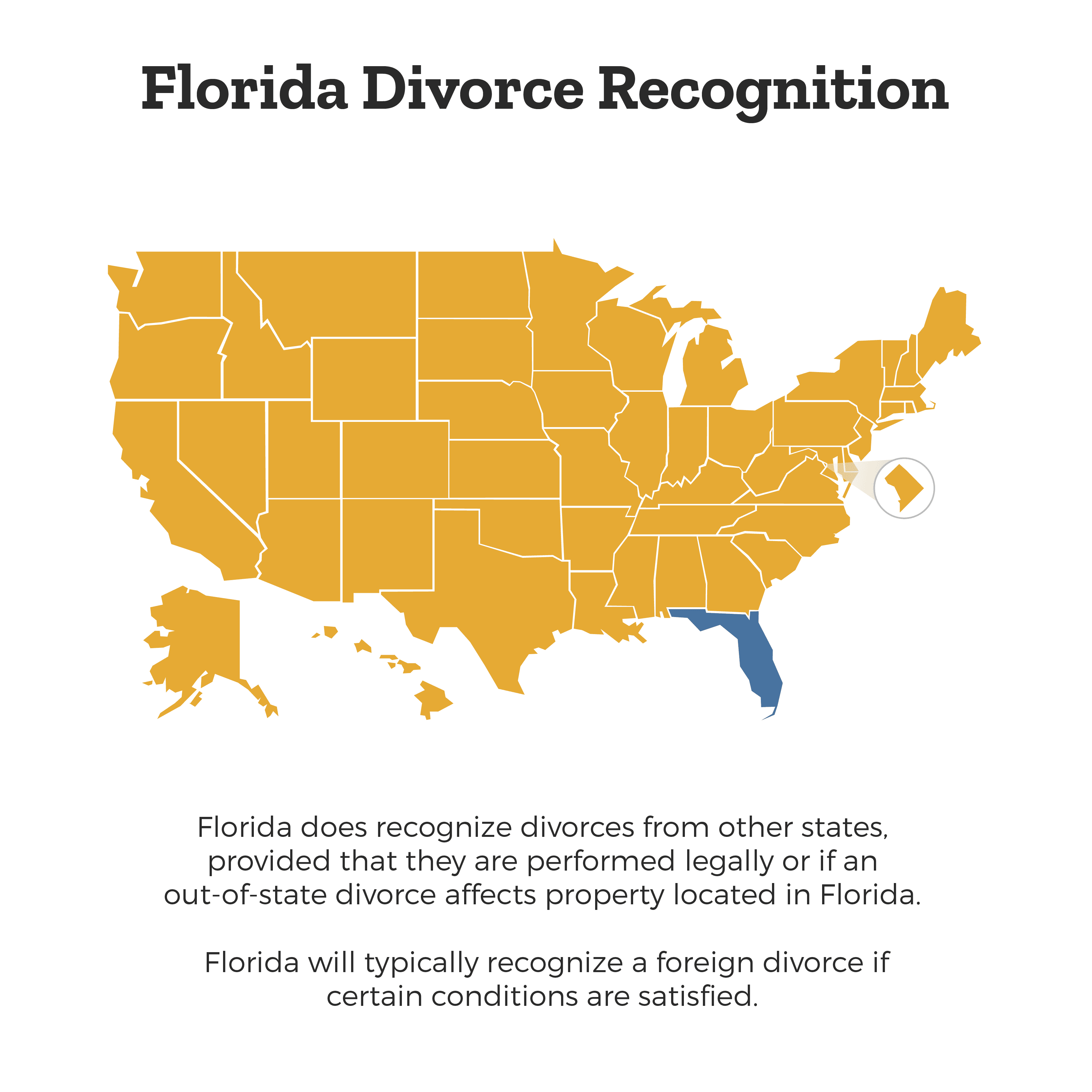Divorce Laws in Florida
Being that every marriage is licensed by the state in which the marriage happened, the only way to undo a legal marriage is by state intervention in court. This process is called divorce or dissolution of marriage. Because the states license marriages, they have control or jurisdiction over all divorce cases. As a general rule, a divorce case is usually within the control of the circuit court (civil trial court). This court is located in the county where the couple last lived as a married couple or in the county where the spouse who is not seeking the divorce lived at the time of the divorce. If the spouse who is not seeking the divorce is not a Florida resident, the divorce may be heard in any state. Florida does recognize divorces that happened in other states (otherwise called full faith and credit), provided that the divorce was performed legally or if the out-of-state divorce affected property located in Florida. States do not have to recognize marriages that happened outside of the United States (foreign marriages), but Florida will typically recognize a foreign divorce if certain conditions are satisfied.

In Florida, a divorce must be a complete severance that totally ends the legal relationship between spouses. In other words, a legal separation does not end a legitimate marriage that is recognized by the state. So there is nothing that can be done in court about a legal separation. A spouse may hire a divorce attorney to represent them throughout the divorce process at the spouse’s own expense. Many law firms and divorce lawyers also provide free consultations for Florida divorces. Florida does not provide attorneys at no cost for family law cases. A law firm or lawyer is not allowed to represent both spouses who are seeking dissolution of marriage.
Divorce is also completely different from annulment, which only cancels a marriage that was never legal to begin with: for example, if one spouse is already married before and at the time of marrying another person. This type of marriage is voidable, and it may be annulled based on the existence of a previous marriage. Florida divorce law allows marriage annulments for other reasons like mental incapacity, incest, age (being under the minimum age to marry), impotence, intoxication, fraud, duress, and/or lack of intent to marry. Consummation of the marriage does not prevent the marriage from being annulled or voided.
A divorce begins when one spouse files a petition for dissolution of marriage with the court in which they seek to obtain a divorce. There is a Florida residency requirement that says at least one spouse must have lived in Florida for at least six months before the divorce began. Although this is not to say that one spouse must be physically present in Florida for the entire six months. If the spouse(s) did not live in Florida for the entire six months, the court is allowed to consider any spouse’s intent to permanently reside in Florida and the reason(s) why they were not present in the state. Florida residency may be proven by presenting government identification (e.g., driver’s license or voter registration card) or by the testimony of a witness.
Florida recognizes two major types of grounds for divorce. The first and most common reason is when a court finds that the marriage is irretrievably broken. As a matter of public policy, Florida and all other states have abolished the at-fault standard of divorce, which declares one party to be more or less the cause of the divorce, in favor of the irretrievably broken standard. When a marriage is declared to be irretrievably broken, it means that the marriage has become so dysfunctional that it cannot be recovered. A court may order the couple to go to marriage counseling to try to determine if the marriage is, in fact, irretrievably broken.
In all cases, at least one spouse must testify in support of the marriage being broken. But it is important to note that even if the court finds that the cause of the marital dysfunction is the result of a condition that may be cured, the court may still declare the marriage to be irretrievably broken. For instance, a marital counselor may determine that one spouse is suffering from treatable depression and that depression is the cause of related marital dysfunction. This finding in and of itself may not necessarily prevent a court from declaring a marriage irretrievably broken. However, the spouses may both agree that the marriage is irretrievably broken. In these cases, if the court finds evidence that the marriage is irretrievably broken, the court must grant a divorce as required by law. The occurrence of domestic violence within the marriage may also be a reason for the court to find a marriage irretrievably broken.
The other major reason for divorce in Florida is what is called incapacity. Incapacity means that one spouse has been legally declared to be mentally incompetent for at least three years before the start of the divorce. A spouse who has been deemed to lack the mental capacity to be married may also submit a petition to divorce through their guardian. In these cases, the court must determine that the spouse who does have capacity contributed to the failure of the marriage in some way. The only defense available to prevent this type of divorce is to deny the accusation of misconduct and present evidence to support the denial. In the absence of a denial, the court will enter a final judgment of dissolution.
Once a court grants a divorce, the spouses will no longer receive the rights enjoyed by married people, such as certain tax protections. The next question that is usually decided when determining the final marital settlement is how the marital assets and debts of the spouses will be divided. This process begins with each spouse submitting a financial affidavit to the court, which discloses financial information relating to each spouse’s assets and debts. This financial disclosure may include bank statements and tax returns. If the spouses do not agree to their own set of property settlement terms, Florida will divide marital property according to a part of the divorce process known as equitable distribution. This term can be misleading because the name implies a 50/50 split of the spouses’ property. However, this is not the case for the majority of divorce settlements. What equitable distribution actually means is that after each spouse discloses all of their assets and debts to the court, land and personal property will be distributed according to what is in the best interest for each spouse to receive, given the circumstances unique to their individual situations.
It is important to be aware that Florida considers the marital property to be the property that was acquired and/or improved during the marriage by one or both spouses. For example, if one spouse owns a house before the marriage, and this house becomes the marital home, it will not be considered marital property for distribution purposes. But if the other spouse renovates the marital home at their expense during the marriage, the improvements will be considered marital property, and an increase in the house’s value will be considered marital property and subject to equitable distribution. Any properties owned or improved by a spouse before the marriage will be considered nonmarital assets. The Florida constitution gives increased tax protections for homestead property (land on which a Florida resident lives), and these protections may be given back to the original owner. Also, divorce attorney fees and filing fees relating to the divorce may also be awarded according to fairness.
The spouses may arrange their own marital settlement agreement (before, during, or after the marriage) by which marital assets and debts are to be distributed. This agreement may also include other types of marital plans such as parenting plans and child care. This type of agreement is called a prenuptial agreement (often loosely referred to as a “prenup”). Florida requires that all prenups be in a writing signed by both spouses, each spouse must have an opportunity to seek the legal advice of their attorney of choice, and the prenup must not have been formed as a result of any threats (physical, legal, or financial) or coercion (fraud). The prenup can be designed to distribute all or part of the spouses’ property, and the agreement may be changed by creating a new agreement that will take the place of the original prenup. But the new prenup must meet all the legal requirements to be considered valid.
In many cases, one spouse may be ordered to pay a certain amount of spousal support to another spouse to support a spouse who may lack the ability to support him or herself after the divorce adequately. These types of support payments are known as alimony. It is based on the economic circumstances of each spouse. Specifically, it is based on the idea that one spouse has a need, and the other spouse can pay. It is also based, in part, on the length of the marriage or the amount of time the parties were married. The court is also allowed to consider the standard of living that the spouses maintained while they were married. Florida statutes have established several types of alimony that may be awarded in Florida, and the alimony a court may award depends entirely on the circumstances surrounding each individual situation.

For example, an award of alimony is highly likely to be granted to a spouse who has opted to manage dependent children and household affairs instead of working professionally during the marriage. Alimony may be modified (increased or decreased) by a court if the person seeking to modify the alimony can demonstrate a change in their circumstances that have had a major effect on their ability to pay, such as an involuntary job loss. On the other hand, a recipient may demonstrate a need to increase alimony payments for a variety of reasons, such as increased expenses related to child support. Alimony may also be terminated for several reasons, such as the death or remarriage of one spouse.
